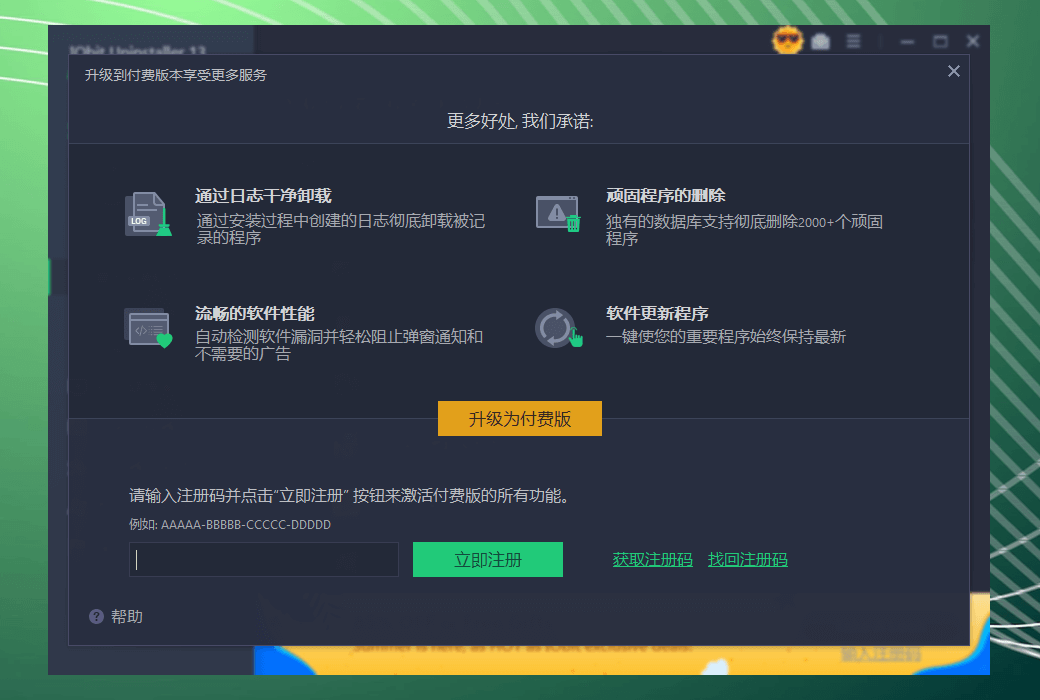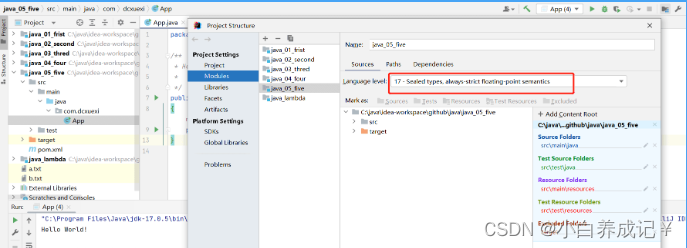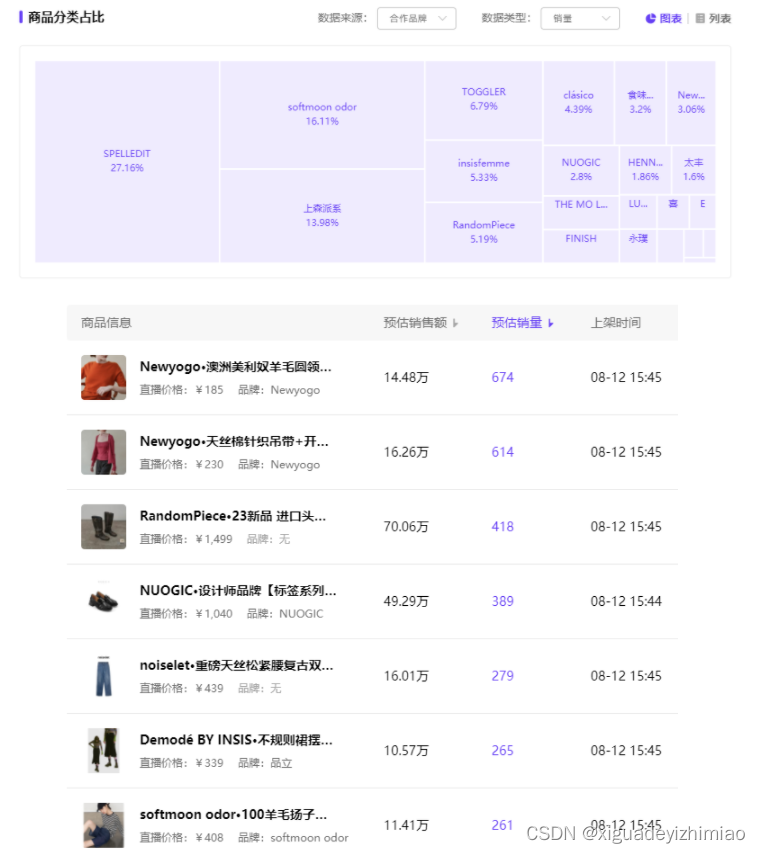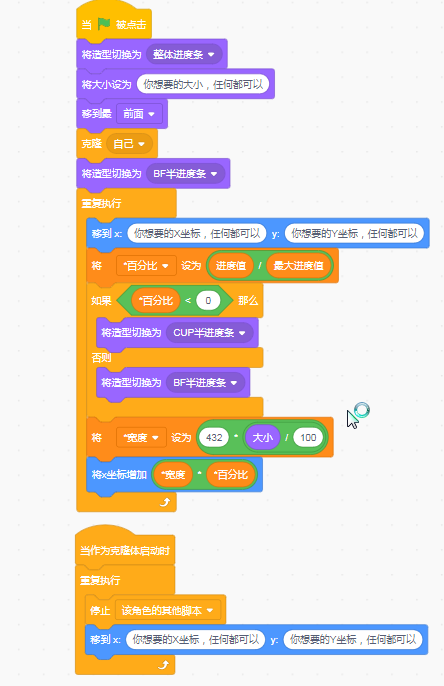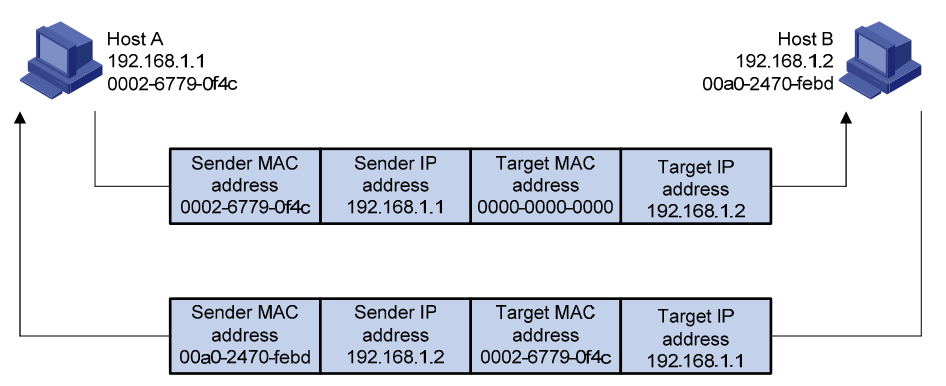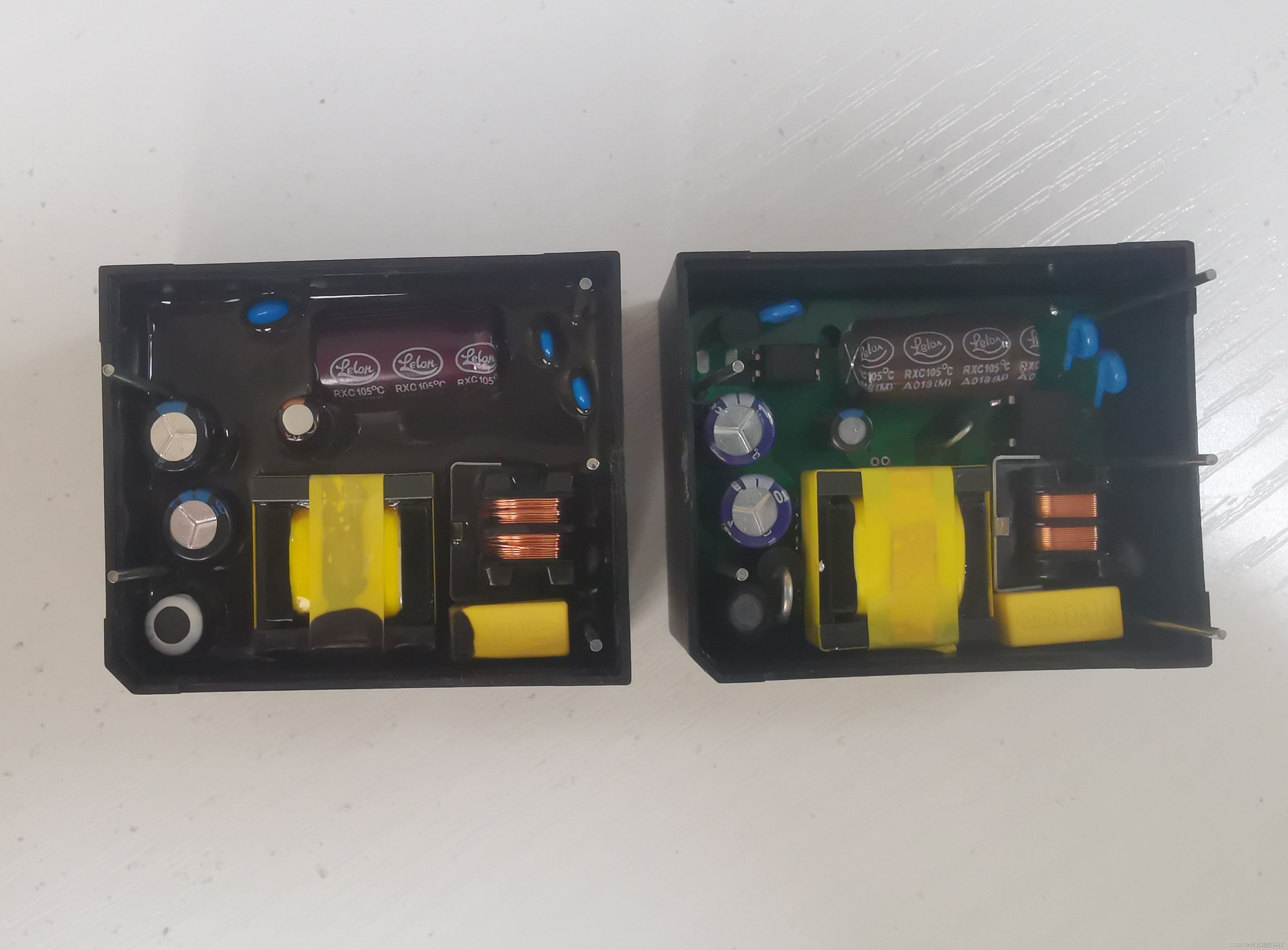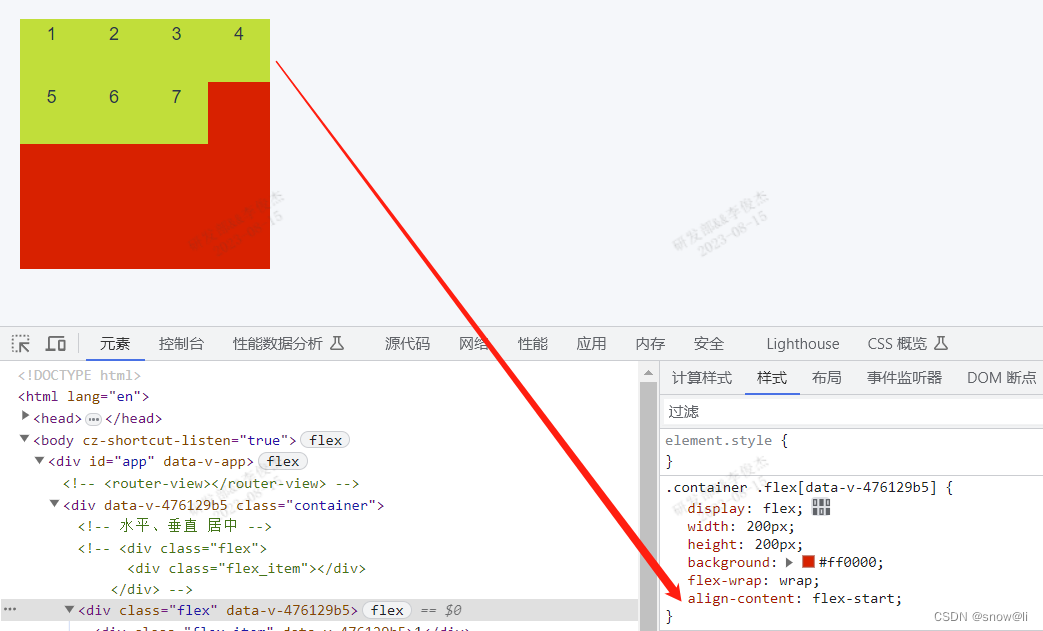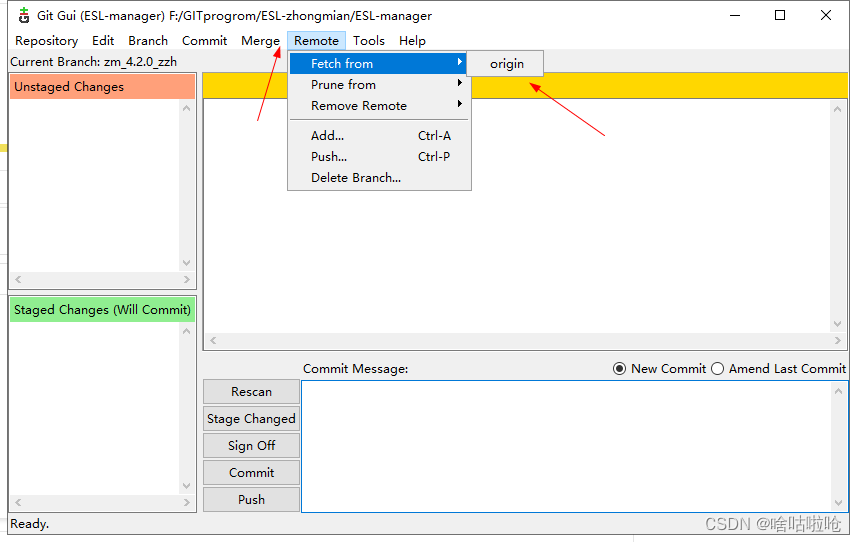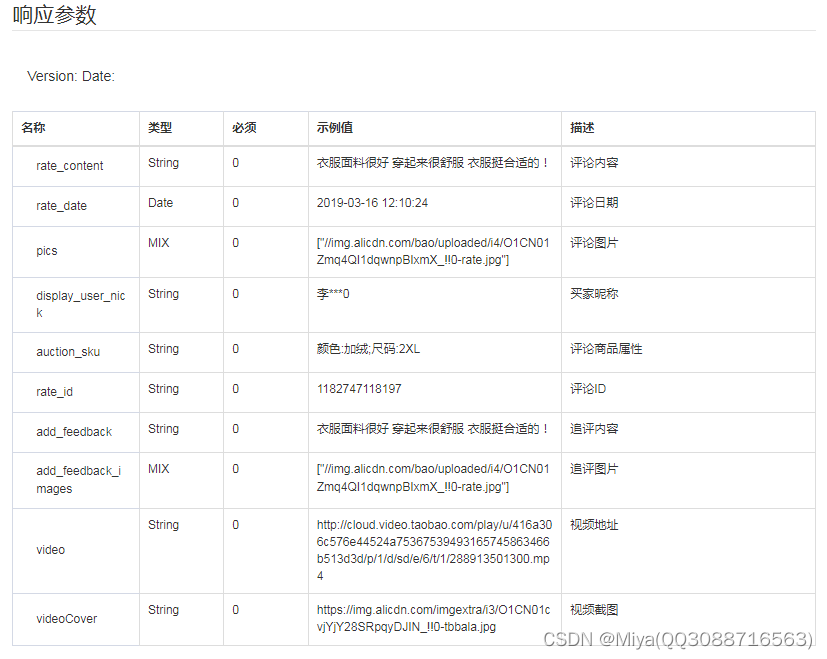vmagent
使用以下命令添加图表 helm 存储库:
helm repo add vm https://victoriametrics.github.io/helm-charts/
helm repo update
列出vm/victoria-metrics-agent可供安装的图表版本:
helm search repo vm/victoria-metrics-agent -l
victoria-metrics-agent将图表的默认值导出到文件values.yaml:
mkdir vmagent
cd vmagent/
helm show values vm/victoria-metrics-agent > values.yaml
根据环境需要更改values.yaml文件中的值。
# Default values for victoria-metrics-agent.
# This is a YAML-formatted file.
# Declare variables to be passed into your templates.
replicaCount: 1
# ref: https://kubernetes.io/docs/concepts/workloads/controllers/deployment/
deployment:
enabled: true
# ref: https://kubernetes.io/docs/concepts/workloads/controllers/deployment/#strategy
strategy: {}
# rollingUpdate:
# maxSurge: 25%
# maxUnavailable: 25%
# type: RollingUpdate
# ref: https://kubernetes.io/docs/concepts/workloads/controllers/statefulset/
statefulset:
enabled: false
# ref: https://kubernetes.io/docs/concepts/workloads/controllers/statefulset/#update-strategies
updateStrategy: {}
# type: RollingUpdate
image:
repository: victoriametrics/vmagent
tag: "" # rewrites Chart.AppVersion
pullPolicy: IfNotPresent
imagePullSecrets: []
nameOverride: ""
fullnameOverride: ""
containerWorkingDir: "/"
rbac:
create: true
pspEnabled: true
annotations: {}
extraLabels: {}
serviceAccount:
# Specifies whether a service account should be created
create: true
# Annotations to add to the service account
annotations: {}
# The name of the service account to use.
# If not set and create is true, a name is generated using the fullname template
name:
## See `kubectl explain poddisruptionbudget.spec` for more
## ref: https://kubernetes.io/docs/tasks/run-application/configure-pdb/
podDisruptionBudget:
enabled: false
# minAvailable: 1
# maxUnavailable: 1
labels: {}
# WARN: need to specify at least one remote write url or one multi tenant url
remoteWriteUrls:
- http://192.168.127.185:8480/insert/0/prometheus
# - http://prometheus:8480/insert/0/prometheus
multiTenantUrls: []
# multiTenantUrls:
# - http://vm-insert-az1:8480
# - http://vm-insert-az2:8480
extraArgs:
envflag.enable: "true"
envflag.prefix: VM_
loggerFormat: json
# promscrape.maxScrapeSize: "167772160"
# Uncomment and specify the port if you want to support any of the protocols:
# https://victoriametrics.github.io/vmagent.html#features
# graphiteListenAddr: ":2003"
# influxListenAddr: ":8189"
# opentsdbHTTPListenAddr: ":4242"
# opentsdbListenAddr: ":4242"
# -- Additional environment variables (ex.: secret tokens, flags) https://github.com/VictoriaMetrics/VictoriaMetrics#environment-variables
env:
[]
# - name: VM_remoteWrite_basicAuth_password
# valueFrom:
# secretKeyRef:
# name: auth_secret
# key: password
# extra Labels for Pods, Deployment and Statefulset
extraLabels: {}
# extra Labels for Pods only
podLabels: {}
# Additional hostPath mounts
extraHostPathMounts:
[]
# - name: certs-dir
# mountPath: /etc/kubernetes/certs
# subPath: ""
# hostPath: /etc/kubernetes/certs
# readOnly: true
# Extra Volumes for the pod
extraVolumes:
[]
# - name: example
# configMap:
# name: example
# Extra Volume Mounts for the container
extraVolumeMounts:
[]
# - name: example
# mountPath: /example
extraContainers: []
# - name: config-reloader
# image: reloader-image
podSecurityContext:
{}
# fsGroup: 2000
securityContext:
{}
# capabilities:
# drop:
# - ALL
# readOnlyRootFilesystem: true
# runAsNonRoot: true
# runAsUser: 1000
service:
enabled: true
annotations: {}
extraLabels: {}
clusterIP: ""
## Ref: https://kubernetes.io/docs/user-guide/services/#external-ips
##
externalIPs: []
loadBalancerIP: ""
loadBalancerSourceRanges: []
servicePort: 8429
type: ClusterIP
# Ref: https://kubernetes.io/docs/tasks/access-application-cluster/create-external-load-balancer/#preserving-the-client-source-ip
# externalTrafficPolicy: "local"
# healthCheckNodePort: 0
ingress:
enabled: false
annotations: {}
# kubernetes.io/ingress.class: nginx
# kubernetes.io/tls-acme: 'true'
extraLabels: {}
hosts: []
# - name: vmagent.local
# path: /
# port: http
tls: []
# - secretName: vmagent-ingress-tls
# hosts:
# - vmagent.local
# For Kubernetes >= 1.18 you should specify the ingress-controller via the field ingressClassName
# See https://kubernetes.io/blog/2020/04/02/improvements-to-the-ingress-api-in-kubernetes-1.18/#specifying-the-class-of-an-ingress
# ingressClassName: nginx
# -- pathType is only for k8s >= 1.1=
pathType: Prefix
resources:
{}
# We usually recommend not to specify default resources and to leave this as a conscious
# choice for the user. This also increases chances charts run on environments with little
# resources, such as Minikube. If you do want to specify resources, uncomment the following
# lines, adjust them as necessary, and remove the curly braces after 'resources:'.
# limits:
# cpu: 100m
# memory: 128Mi
# requests:
# cpu: 100m
# memory: 128Mi
# Annotations to be added to the deployment
annotations: {}
# Annotations to be added to pod
podAnnotations: {}
nodeSelector: {}
tolerations: []
affinity: {}
# vmagent scraping configuration:
# https://github.com/VictoriaMetrics/VictoriaMetrics/blob/master/docs/vmagent.md#how-to-collect-metrics-in-prometheus-format
# use existing configmap if specified
# otherwise .config values will be used
configMap: ""
# -- priority class to be assigned to the pod(s)
priorityClassName: ""
serviceMonitor:
enabled: false
extraLabels: {}
annotations: {}
# interval: 15s
# scrapeTimeout: 5s
# -- Commented. HTTP scheme to use for scraping.
# scheme: https
# -- Commented. TLS configuration to use when scraping the endpoint
# tlsConfig:
# insecureSkipVerify: true
persistence:
enabled: false
# storageClassName: default
accessModes:
- ReadWriteOnce
size: 10Gi
annotations: {}
extraLabels: {}
existingClaim: ""
# -- Bind Persistent Volume by labels. Must match all labels of targeted PV.
matchLabels: {}
config:
global:
scrape_interval: 10s
# scrape self by default
scrape_configs:
- job_name: node-exporter
static_configs:
- targets: ["10.1.138.177:9100"]
- targets: ["10.1.138.178:9100"]
## COPY from Prometheus helm chart https://github.com/helm/charts/blob/master/stable/prometheus/values.yaml
# Scrape config for API servers.
#
# Kubernetes exposes API servers as endpoints to the default/kubernetes
# service so this uses `endpoints` role and uses relabelling to only keep
# the endpoints associated with the default/kubernetes service using the
# default named port `https`. This works for single API server deployments as
# well as HA API server deployments.
- job_name: "kubernetes-apiservers"
kubernetes_sd_configs:
- role: endpoints
# Default to scraping over https. If required, just disable this or change to
# `http`.
scheme: https
# This TLS & bearer token file config is used to connect to the actual scrape
# endpoints for cluster components. This is separate to discovery auth
# configuration because discovery & scraping are two separate concerns in
# Prometheus. The discovery auth config is automatic if Prometheus runs inside
# the cluster. Otherwise, more config options have to be provided within the
# <kubernetes_sd_config>.
tls_config:
ca_file: /var/run/secrets/kubernetes.io/serviceaccount/ca.crt
# If your node certificates are self-signed or use a different CA to the
# master CA, then disable certificate verification below. Note that
# certificate verification is an integral part of a secure infrastructure
# so this should only be disabled in a controlled environment. You can
# disable certificate verification by uncommenting the line below.
#
insecure_skip_verify: true
bearer_token_file: /var/run/secrets/kubernetes.io/serviceaccount/token
# Keep only the default/kubernetes service endpoints for the https port. This
# will add targets for each API server which Kubernetes adds an endpoint to
# the default/kubernetes service.
relabel_configs:
- source_labels:
[
__meta_kubernetes_namespace,
__meta_kubernetes_service_name,
__meta_kubernetes_endpoint_port_name,
]
action: keep
regex: default;kubernetes;https
- job_name: "kubernetes-nodes"
# Default to scraping over https. If required, just disable this or change to
# `http`.
scheme: https
# This TLS & bearer token file config is used to connect to the actual scrape
# endpoints for cluster components. This is separate to discovery auth
# configuration because discovery & scraping are two separate concerns in
# Prometheus. The discovery auth config is automatic if Prometheus runs inside
# the cluster. Otherwise, more config options have to be provided within the
# <kubernetes_sd_config>.
tls_config:
ca_file: /var/run/secrets/kubernetes.io/serviceaccount/ca.crt
# If your node certificates are self-signed or use a different CA to the
# master CA, then disable certificate verification below. Note that
# certificate verification is an integral part of a secure infrastructure
# so this should only be disabled in a controlled environment. You can
# disable certificate verification by uncommenting the line below.
#
insecure_skip_verify: true
bearer_token_file: /var/run/secrets/kubernetes.io/serviceaccount/token
kubernetes_sd_configs:
- role: node
relabel_configs:
- action: labelmap
regex: __meta_kubernetes_node_label_(.+)
- target_label: __address__
replacement: kubernetes.default.svc:443
- source_labels: [__meta_kubernetes_node_name]
regex: (.+)
target_label: __metrics_path__
replacement: /api/v1/nodes/$1/proxy/metrics
- job_name: "kubernetes-nodes-cadvisor"
# Default to scraping over https. If required, just disable this or change to
# `http`.
scheme: https
# This TLS & bearer token file config is used to connect to the actual scrape
# endpoints for cluster components. This is separate to discovery auth
# configuration because discovery & scraping are two separate concerns in
# Prometheus. The discovery auth config is automatic if Prometheus runs inside
# the cluster. Otherwise, more config options have to be provided within the
# <kubernetes_sd_config>.
tls_config:
ca_file: /var/run/secrets/kubernetes.io/serviceaccount/ca.crt
# If your node certificates are self-signed or use a different CA to the
# master CA, then disable certificate verification below. Note that
# certificate verification is an integral part of a secure infrastructure
# so this should only be disabled in a controlled environment. You can
# disable certificate verification by uncommenting the line below.
#
insecure_skip_verify: true
bearer_token_file: /var/run/secrets/kubernetes.io/serviceaccount/token
kubernetes_sd_configs:
- role: node
# This configuration will work only on kubelet 1.7.3+
# As the scrape endpoints for cAdvisor have changed
# if you are using older version you need to change the replacement to
# replacement: /api/v1/nodes/$1:4194/proxy/metrics
# more info here https://github.com/coreos/prometheus-operator/issues/633
relabel_configs:
- action: labelmap
regex: __meta_kubernetes_node_label_(.+)
- target_label: __address__
replacement: kubernetes.default.svc:443
- source_labels: [__meta_kubernetes_node_name]
regex: (.+)
target_label: __metrics_path__
replacement: /api/v1/nodes/$1/proxy/metrics/cadvisor
# Scrape config for service endpoints.
#
# The relabeling allows the actual service scrape endpoint to be configured
# via the following annotations:
#
# * `prometheus.io/scrape`: Only scrape services that have a value of `true`
# * `prometheus.io/scheme`: If the metrics endpoint is secured then you will need
# to set this to `https` & most likely set the `tls_config` of the scrape config.
# * `prometheus.io/path`: If the metrics path is not `/metrics` override this.
# * `prometheus.io/port`: If the metrics are exposed on a different port to the
# service then set this appropriately.
- job_name: "kubernetes-service-endpoints"
kubernetes_sd_configs:
- role: endpoints
relabel_configs:
- action: drop
source_labels: [__meta_kubernetes_pod_container_init]
regex: true
- action: keep_if_equal
source_labels: [__meta_kubernetes_service_annotation_prometheus_io_port, __meta_kubernetes_pod_container_port_number]
- source_labels:
[__meta_kubernetes_service_annotation_prometheus_io_scrape]
action: keep
regex: true
- source_labels:
[__meta_kubernetes_service_annotation_prometheus_io_scheme]
action: replace
target_label: __scheme__
regex: (https?)
- source_labels:
[__meta_kubernetes_service_annotation_prometheus_io_path]
action: replace
target_label: __metrics_path__
regex: (.+)
- source_labels:
[
__address__,
__meta_kubernetes_service_annotation_prometheus_io_port,
]
action: replace
target_label: __address__
regex: ([^:]+)(?::\d+)?;(\d+)
replacement: $1:$2
- action: labelmap
regex: __meta_kubernetes_service_label_(.+)
- source_labels: [__meta_kubernetes_namespace]
action: replace
target_label: kubernetes_namespace
- source_labels: [__meta_kubernetes_service_name]
action: replace
target_label: kubernetes_name
- source_labels: [__meta_kubernetes_pod_node_name]
action: replace
target_label: kubernetes_node
# Scrape config for slow service endpoints; same as above, but with a larger
# timeout and a larger interval
#
# The relabeling allows the actual service scrape endpoint to be configured
# via the following annotations:
#
# * `prometheus.io/scrape-slow`: Only scrape services that have a value of `true`
# * `prometheus.io/scheme`: If the metrics endpoint is secured then you will need
# to set this to `https` & most likely set the `tls_config` of the scrape config.
# * `prometheus.io/path`: If the metrics path is not `/metrics` override this.
# * `prometheus.io/port`: If the metrics are exposed on a different port to the
# service then set this appropriately.
- job_name: "kubernetes-service-endpoints-slow"
scrape_interval: 5m
scrape_timeout: 30s
kubernetes_sd_configs:
- role: endpoints
relabel_configs:
- action: drop
source_labels: [__meta_kubernetes_pod_container_init]
regex: true
- action: keep_if_equal
source_labels: [__meta_kubernetes_service_annotation_prometheus_io_port, __meta_kubernetes_pod_container_port_number]
- source_labels:
[__meta_kubernetes_service_annotation_prometheus_io_scrape_slow]
action: keep
regex: true
- source_labels:
[__meta_kubernetes_service_annotation_prometheus_io_scheme]
action: replace
target_label: __scheme__
regex: (https?)
- source_labels:
[__meta_kubernetes_service_annotation_prometheus_io_path]
action: replace
target_label: __metrics_path__
regex: (.+)
- source_labels:
[
__address__,
__meta_kubernetes_service_annotation_prometheus_io_port,
]
action: replace
target_label: __address__
regex: ([^:]+)(?::\d+)?;(\d+)
replacement: $1:$2
- action: labelmap
regex: __meta_kubernetes_service_label_(.+)
- source_labels: [__meta_kubernetes_namespace]
action: replace
target_label: kubernetes_namespace
- source_labels: [__meta_kubernetes_service_name]
action: replace
target_label: kubernetes_name
- source_labels: [__meta_kubernetes_pod_node_name]
action: replace
target_label: kubernetes_node
# Example scrape config for probing services via the Blackbox Exporter.
#
# The relabeling allows the actual service scrape endpoint to be configured
# via the following annotations:
#
# * `prometheus.io/probe`: Only probe services that have a value of `true`
- job_name: "kubernetes-services"
metrics_path: /probe
params:
module: [http_2xx]
kubernetes_sd_configs:
- role: service
relabel_configs:
- source_labels:
[__meta_kubernetes_service_annotation_prometheus_io_probe]
action: keep
regex: true
- source_labels: [__address__]
target_label: __param_target
- target_label: __address__
replacement: blackbox
- source_labels: [__param_target]
target_label: instance
- action: labelmap
regex: __meta_kubernetes_service_label_(.+)
- source_labels: [__meta_kubernetes_namespace]
target_label: kubernetes_namespace
- source_labels: [__meta_kubernetes_service_name]
target_label: kubernetes_name
# Example scrape config for pods
#
# The relabeling allows the actual pod scrape endpoint to be configured via the
# following annotations:
#
# * `prometheus.io/scrape`: Only scrape pods that have a value of `true`
# * `prometheus.io/path`: If the metrics path is not `/metrics` override this.
# * `prometheus.io/port`: Scrape the pod on the indicated port instead of the default of `9102`.
- job_name: "kubernetes-pods"
kubernetes_sd_configs:
- role: pod
relabel_configs:
- action: drop
source_labels: [__meta_kubernetes_pod_container_init]
regex: true
- action: keep_if_equal
source_labels: [__meta_kubernetes_pod_annotation_prometheus_io_port, __meta_kubernetes_pod_container_port_number]
- source_labels: [__meta_kubernetes_pod_annotation_prometheus_io_scrape]
action: keep
regex: true
- source_labels: [__meta_kubernetes_pod_annotation_prometheus_io_path]
action: replace
target_label: __metrics_path__
regex: (.+)
- source_labels:
[__address__, __meta_kubernetes_pod_annotation_prometheus_io_port]
action: replace
regex: ([^:]+)(?::\d+)?;(\d+)
replacement: $1:$2
target_label: __address__
- action: labelmap
regex: __meta_kubernetes_pod_label_(.+)
- source_labels: [__meta_kubernetes_namespace]
action: replace
target_label: kubernetes_namespace
- source_labels: [__meta_kubernetes_pod_name]
action: replace
target_label: kubernetes_pod_name
## End of COPY
# -- Extra scrape configs that will be appended to `config`
extraScrapeConfigs: []
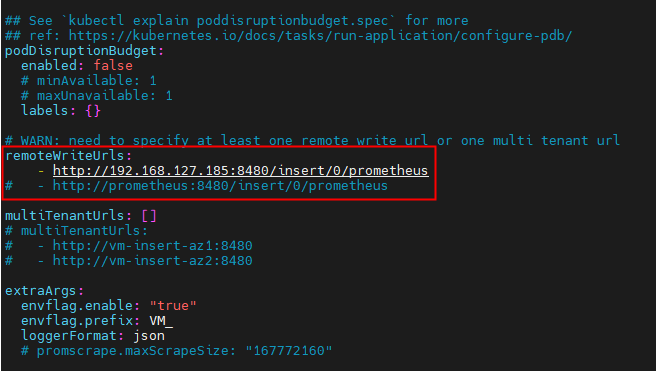
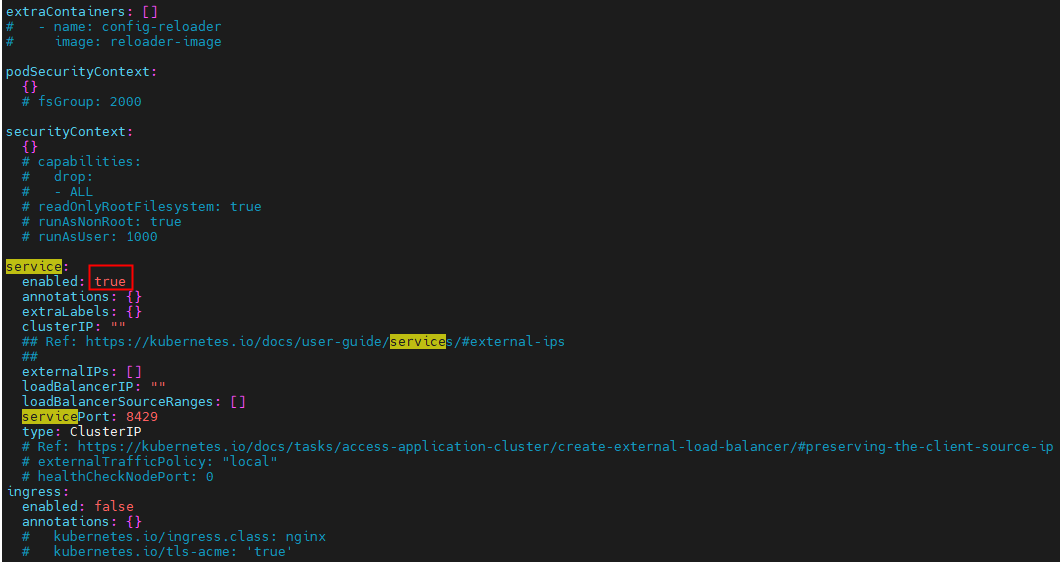
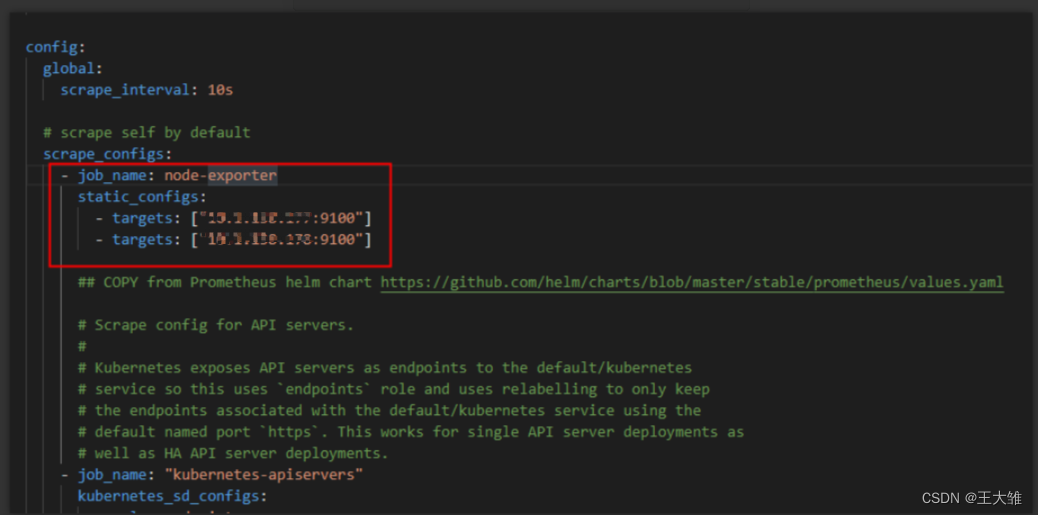
使用命令测试安装:
helm install vmagent vm/victoria-metrics-agent -f values.yaml -n victoria-metrics --debug --dry-run
使用命令安装:
helm install vmagent vm/victoria-metrics-agent -f values.yaml -n victoria-metrics
通过运行以下命令获取 pod 列表:
kubectl get pods -A | grep 'agent'
通过运行以下命令获取应用程序:
helm list -f vmagent -n victoria-metrics
使用命令查看应用程序版本的历史记录vmagent。
helm history vmagent -n victoria-metrics
更新配置
cd vmagent/
#修改value.yaml文件
helm upgrade vmagent vm/victoria-metrics-agent -f values.yaml -n victoria-metrics
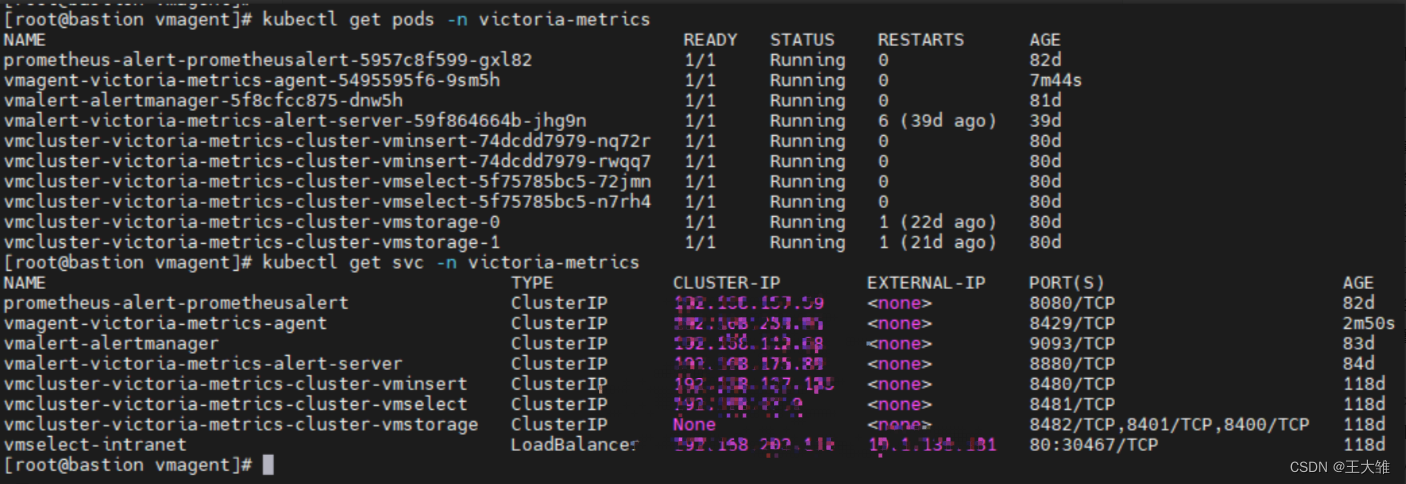
vmgent deployment
[root@bastion ci-test]# kubectl get deploy vmagent-victoria-metrics-agent -n victoria-metrics -o yaml
apiVersion: apps/v1
kind: Deployment
metadata:
annotations:
deployment.kubernetes.io/revision: "6"
meta.helm.sh/release-name: vmagent
meta.helm.sh/release-namespace: victoria-metrics
creationTimestamp: "2022-06-22T05:53:42Z"
generation: 6
labels:
app.kubernetes.io/instance: vmagent
app.kubernetes.io/managed-by: Helm
app.kubernetes.io/name: victoria-metrics-agent
app.kubernetes.io/version: v1.78.0
helm.sh/chart: victoria-metrics-agent-0.8.8
name: vmagent-victoria-metrics-agent
namespace: victoria-metrics
resourceVersion: "64544377"
uid: 964ad1c5-8e52-4173-8cdd-4c138845f9c9
spec:
progressDeadlineSeconds: 600
replicas: 1
revisionHistoryLimit: 10
selector:
matchLabels:
app.kubernetes.io/instance: vmagent
app.kubernetes.io/name: victoria-metrics-agent
strategy:
rollingUpdate:
maxSurge: 25%
maxUnavailable: 25%
type: RollingUpdate
template:
metadata:
annotations:
checksum/config: 05df4ae3a0ba0f3719e0e0be1197216ea9c8d5a9f12fdb211b0aea2af9d24d8c
creationTimestamp: null
labels:
app.kubernetes.io/instance: vmagent
app.kubernetes.io/name: victoria-metrics-agent
spec:
containers:
- args:
- -promscrape.config=/config/scrape.yml
- -remoteWrite.tmpDataPath=/tmpData
- -remoteWrite.url=http://192.168.127.185:8480/insert/0/prometheus
- -envflag.enable=true
- -envflag.prefix=VM_
- -loggerFormat=json
image: victoriametrics/vmagent:v1.83.0
imagePullPolicy: IfNotPresent
livenessProbe:
failureThreshold: 3
initialDelaySeconds: 5
periodSeconds: 15
successThreshold: 1
tcpSocket:
port: http
timeoutSeconds: 5
name: victoria-metrics-agent
ports:
- containerPort: 8429
name: http
protocol: TCP
readinessProbe:
failureThreshold: 3
httpGet:
path: /health
port: http
scheme: HTTP
initialDelaySeconds: 5
periodSeconds: 15
successThreshold: 1
timeoutSeconds: 1
resources: {}
securityContext: {}
terminationMessagePath: /dev/termination-log
terminationMessagePolicy: File
volumeMounts:
- mountPath: /tmpData
name: tmpdata
- mountPath: /config
name: config
workingDir: /
dnsPolicy: ClusterFirst
restartPolicy: Always
schedulerName: default-scheduler
securityContext: {}
serviceAccount: vmagent-victoria-metrics-agent
serviceAccountName: vmagent-victoria-metrics-agent
terminationGracePeriodSeconds: 30
volumes:
- emptyDir: {}
name: tmpdata
- configMap:
defaultMode: 420
name: vmagent-victoria-metrics-agent-config
name: config
status:
availableReplicas: 1
conditions:
- lastTransitionTime: "2022-06-22T06:28:44Z"
lastUpdateTime: "2022-11-02T02:35:05Z"
message: ReplicaSet "vmagent-victoria-metrics-agent-75d9758b9f" has successfully
progressed.
reason: NewReplicaSetAvailable
status: "True"
type: Progressing
- lastTransitionTime: "2022-11-02T09:55:33Z"
lastUpdateTime: "2022-11-02T09:55:33Z"
message: Deployment has minimum availability.
reason: MinimumReplicasAvailable
status: "True"
type: Available
observedGeneration: 6
readyReplicas: 1
replicas: 1
updatedReplicas: 1
node-exporter
使用以下命令添加 helm chart存储库
helm repo add prometheus-community https://prometheus-community.github.io/helm-charts
helm repo update
列出vm/victoria-metrics-agent可供安装的图表版本:
helm search repo prometheus-community/prometheus-node-exporter -l
victoria-metrics-agent将图表的默认值导出到文件values.yaml:
mkdir node-exporter
cd node-exporter/
helm show values prometheus-community/prometheus-node-exporter > values.yaml
根据环境需要更改values.yaml文件中的值。
# Default values for prometheus-node-exporter.
# This is a YAML-formatted file.
# Declare variables to be passed into your templates.
image:
repository: quay.io/prometheus/node-exporter
# Overrides the image tag whose default is {{ printf "v%s" .Chart.AppVersion }}
tag: ""
pullPolicy: IfNotPresent
imagePullSecrets: []
# - name: "image-pull-secret"
service:
type: ClusterIP
port: 9100
targetPort: 9100
nodePort:
portName: metrics
listenOnAllInterfaces: true
annotations:
prometheus.io/scrape: "true"
# Additional environment variables that will be passed to the daemonset
env: {}
## env:
## VARIABLE: value
prometheus:
monitor:
enabled: false
additionalLabels: {}
namespace: ""
jobLabel: ""
scheme: http
basicAuth: {}
bearerTokenFile:
tlsConfig: {}
## proxyUrl: URL of a proxy that should be used for scraping.
##
proxyUrl: ""
## Override serviceMonitor selector
##
selectorOverride: {}
relabelings: []
metricRelabelings: []
interval: ""
scrapeTimeout: 10s
## Customize the updateStrategy if set
updateStrategy:
type: RollingUpdate
rollingUpdate:
maxUnavailable: 1
resources: {}
# We usually recommend not to specify default resources and to leave this as a conscious
# choice for the user. This also increases chances charts run on environments with little
# resources, such as Minikube. If you do want to specify resources, uncomment the following
# lines, adjust them as necessary, and remove the curly braces after 'resources:'.
# limits:
# cpu: 200m
# memory: 50Mi
# requests:
# cpu: 100m
# memory: 30Mi
serviceAccount:
# Specifies whether a ServiceAccount should be created
create: true
# The name of the ServiceAccount to use.
# If not set and create is true, a name is generated using the fullname template
name:
annotations: {}
imagePullSecrets: []
automountServiceAccountToken: false
securityContext:
fsGroup: 65534
runAsGroup: 65534
runAsNonRoot: true
runAsUser: 65534
containerSecurityContext: {}
# capabilities:
# add:
# - SYS_TIME
rbac:
## If true, create & use RBAC resources
##
create: true
## If true, create & use Pod Security Policy resources
## https://kubernetes.io/docs/concepts/policy/pod-security-policy/
pspEnabled: true
pspAnnotations: {}
# for deployments that have node_exporter deployed outside of the cluster, list
# their addresses here
endpoints: []
# Expose the service to the host network
hostNetwork: true
# Share the host process ID namespace
hostPID: true
# Mount the node's root file system (/) at /host/root in the container
hostRootFsMount:
enabled: true
# Defines how new mounts in existing mounts on the node or in the container
# are propagated to the container or node, respectively. Possible values are
# None, HostToContainer, and Bidirectional. If this field is omitted, then
# None is used. More information on:
# https://kubernetes.io/docs/concepts/storage/volumes/#mount-propagation
mountPropagation: HostToContainer
## Assign a group of affinity scheduling rules
##
affinity: {}
# nodeAffinity:
# requiredDuringSchedulingIgnoredDuringExecution:
# nodeSelectorTerms:
# - matchFields:
# - key: metadata.name
# operator: In
# values:
# - target-host-name
# Annotations to be added to node exporter pods
podAnnotations:
# Fix for very slow GKE cluster upgrades
cluster-autoscaler.kubernetes.io/safe-to-evict: "true"
# Extra labels to be added to node exporter pods
podLabels: {}
# Custom DNS configuration to be added to prometheus-node-exporter pods
dnsConfig: {}
# nameservers:
# - 1.2.3.4
# searches:
# - ns1.svc.cluster-domain.example
# - my.dns.search.suffix
# options:
# - name: ndots
# value: "2"
# - name: edns0
## Assign a nodeSelector if operating a hybrid cluster
##
nodeSelector: {}
# beta.kubernetes.io/arch: amd64
# beta.kubernetes.io/os: linux
tolerations:
- effect: NoSchedule
operator: Exists
## Assign a PriorityClassName to pods if set
# priorityClassName: ""
## Additional container arguments
##
extraArgs: []
# - --collector.diskstats.ignored-devices=^(ram|loop|fd|(h|s|v)d[a-z]|nvme\\d+n\\d+p)\\d+$
# - --collector.textfile.directory=/run/prometheus
## Additional mounts from the host
##
extraHostVolumeMounts: []
# - name: <mountName>
# hostPath: <hostPath>
# mountPath: <mountPath>
# readOnly: true|false
# mountPropagation: None|HostToContainer|Bidirectional
## Additional configmaps to be mounted.
##
configmaps: []
# - name: <configMapName>
# mountPath: <mountPath>
secrets: []
# - name: <secretName>
# mountPath: <mountPatch>
## Override the deployment namespace
##
namespaceOverride: ""
## Additional containers for export metrics to text file
##
sidecars: []
## - name: nvidia-dcgm-exporter
## image: nvidia/dcgm-exporter:1.4.3
## Volume for sidecar containers
##
sidecarVolumeMount: []
## - name: collector-textfiles
## mountPath: /run/prometheus
## readOnly: false
## Additional InitContainers to initialize the pod
##
extraInitContainers: []
## Liveness probe
##
livenessProbe:
failureThreshold: 3
httpGet:
httpHeaders: []
scheme: http
initialDelaySeconds: 0
periodSeconds: 10
successThreshold: 1
timeoutSeconds: 1
## Readiness probe
##
readinessProbe:
failureThreshold: 3
httpGet:
httpHeaders: []
scheme: http
initialDelaySeconds: 0
periodSeconds: 10
successThreshold: 1
timeoutSeconds: 1
测试安装
helm install node-exporter prometheus-community/prometheus-node-exporter -f values.yaml -n victoria-metrics --debug --dry-run
安装
helm install node-exporter prometheus-community/prometheus-node-exporter -f values.yaml -n victoria-metrics
更新配置
cd node-exporter/
#修改value.yaml文件
helm upgrade node-exporter prometheus-community/prometheus-node-exporter -f values.yaml -n victoria-metrics






